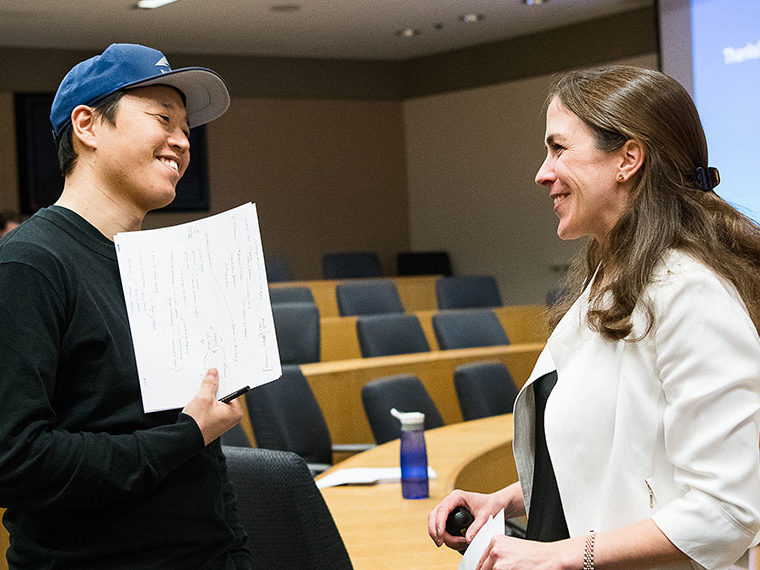A surer path to contentedness might be believing one possesses empathy, even if one doesn’t
For decades scholars have tried to understand if empathic skill is actually beneficial, or detrimental, to the one who innately understands when another person is happy, sad, angry, surprised, ashamed or disgusted.
Research published in Psychological Science provides some clarity. UCLA Anderson’s Joyce C. He and University of Toronto’s Stéphane Côté put to the test five competing theories on how empathy may impact personal happiness and one’s ability to foster stronger relationships. (Empathy, a heavily used term in our culture, is often conflated with sympathy — feeling for others’ plight and being nice.) The paper specifically measures empathic accuracy — how well one perceives the emotions of others.
He and Côté find that being adept at accurately reading others’ emotions seems to help build connections that foster stronger relationships, but it doesn’t make us any happier about our own lives.
Oblivious Much?
Interestingly, participants in this study who reported they think they are good at reading emotions — even when data suggests they are not — reported higher levels of happiness. Believing we are empathic seems to make us feel better about how we are choosing to navigate the world.
Opt In to the Review Monthly Email Update.
That misplaced sense of having empathic skill does not drive strong relationships. Only actual empathic skill — the levels of which were gleaned from asking participants to interpret 72 different photos of people’s faces and report if they were expressing happiness, sadness, anger, surprise, shame or disgust — correlated to participants who were actually more adept at fostering stronger relationships.
He and Côté also provide that straight-up cognitive intelligence (a completely different set of skills from empathy) doesn’t deliver on higher life satisfaction nor does it correlate to being better at relationships.
This project builds on 2019 research He and Côté published in the Journal of Personality and Social Psychology that first laid out the five competing theories and offered preliminary insights on how our perception of empathic skill might drive our sense of our level of happiness. This newer research is larger-scale, leverages more advanced analytical techniques and adds a new form of analysis to complement prior research that solely relied on participant self-reports.
Measuring Empathy: Skill vs. Perception
More than 1,000 undergraduate students were the core group for He and Côté’s experiment. Participants were put through a test to ascertain their skill at reading emotions — empathic accuracy — and also asked to rate themselves for this skill. They were also run through questions to ascertain how they rated their ability to foster strong relationships and their sense of personal well-being.
This reliance on self-reporting has been a standard feature of past empathy research. He and Côté layer in an important addition to this approach by also factoring in the opinions of people who knew the participants. About 2,000 friends/classmates/relatives the participants offered up as leads to the researchers provided feedback on how they felt about their relationship with the target participant and also shared the extent to which they felt that participant was excelling at life satisfaction.
The researchers found consistency between how participants rated themselves and how their people viewed them. Participants who were adept at reading emotions also received higher relationship ratings from their “informants.” This provides new evidence that self-reporting may be a reliable research tool.
Participants who merely thought they were skilled at empathic accuracy were also perceived by the people who knew them as being more satisfied with their lives, giving additional credence to the notion that simply believing we are empathic can have a personal payoff (if not a practical payoff for our personal and professional relationships).
He and Côté also provide important feedback on existing theories that didn’t pan out in their experiment. They found no evidence that people are more well-adjusted only when empathic accuracy is accompanied by a positive self-assessment of one’s abilities. Nor did having a big gap (positive or negative) between actual skill and one’s perceived skill matter in terms of relationship satisfaction and life satisfaction.
This research suggests a nuanced approach to how empathy training might be undertaken. “Actually reading others well is associated with satisfaction with relationships,” they conclude. “But to feel happy about one’s life, the key might be simply thinking that one can read others.”
Featured Faculty
-
Joyce C. He
Assistant Professor of Management and Organizations
About the Research
He, J.C., & Côté, S. (2023). Are Empathic People Better Adjusted? A Test of Competing Models of Empathic Accuracy and Intrapersonal and Interpersonal Facets of Adjustment Using Self- and Peer Reports. Psychological Science, 34(9), 955-967.






